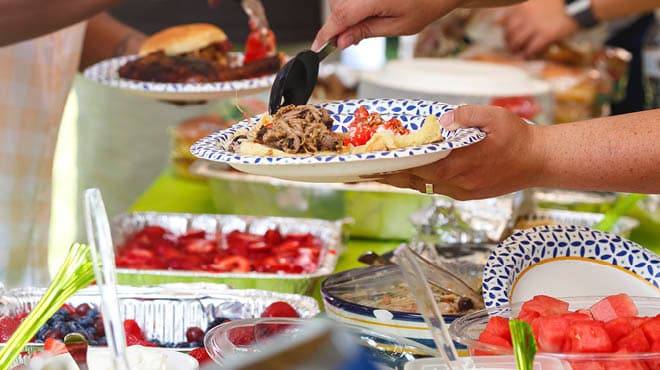-
Health & Wellness
4 essential food safety tips for summertime gatherings

Summer is a season of outdoor gatherings, barbecues and picnics, where food is often at the center of the festivities. However, the warm weather also creates ideal conditions for the growth of harmful bacteria, increasing the risk of foodborne illnesses. It's critical that you follow food safety recommendations so you can enjoy hosting and attending these events without worrying about getting sick.
Follow these four simple tips to prevent foodborne illness:
1. Wash your hands and surfaces often.
Wash your hands frequently, especially when handling food. Always wash your hands after using the bathroom, changing a diaper or touching pets. Also clean your hands before eating and after sneezing or coughing. If you can't use soap and hot, running water, clean your hands with disposable hand wipes before and after working with food. Confirm that all surfaces are clean before preparing food. Regularly sanitize countertops, cutting boards and utensils.
2. Avoid cross-contamination.
When packing a cooler, securely package raw meats and store them separately from other foods to prevent their juices from leaking onto ready-to-eat items. Thoroughly wash any plates, containers and utensils that have come into contact with raw meats or poultry before using them for cooked food. Use separate cutting boards for raw meat and other foods, and always wash your hands after handling raw meat to prevent the spread of harmful bacteria. Keep utensils and food covered until serving time. Flies, other insects and pets can carry germs or salmonella and spread them to your food and serveware if they touch them.
3. Cook food to safe temperatures.
Bring a food thermometer to ensure meat and poultry are fully cooked. Be aware of the recommended internal temperatures for each type of meat. Make sure the thermometer rests in the thickest part of the meat for an accurate reading. Do not partially cook food in advance, as this can allow bacteria to survive and multiply, potentially reaching levels that later cooking won't eliminate.
4. Refrigerate food promptly.
Ensure perishable items, like luncheon and cooked meats, chicken and salads, are always chilled. To avoid temperature fluctuations, consider using a separate cooler for beverages since people will open a drink cooler frequently. Package and put leftovers in a cooler or fridge within two hours after eating. When in doubt about the safety of any food item, throw it out.
If you develop what you suspect is a foodborne illness, keep a careful watch on your symptoms. While many illnesses can be treated by increasing fluid intake to replace lost fluids or electrolytes, severe cases may require further treatment. Seek medical attention right away if you are experiencing symptoms such as diarrhea, high fever, blood in your stools, prolonged vomiting, severe dehydration or signs of shock or confusion.
Next steps:
- Find a family medicine professional near you.
- Request an appointment today.
- Find out how to be sun savvy to protect from skin cancer.
- Get more summer safety tips.
- Learn safety rules when boating.
Michael Ulrich, M.D., is a Family Medicine physician in Albert Lea, Minnesota.
This article first published on the Mayo Clinic Health System blog.
Related Articles







